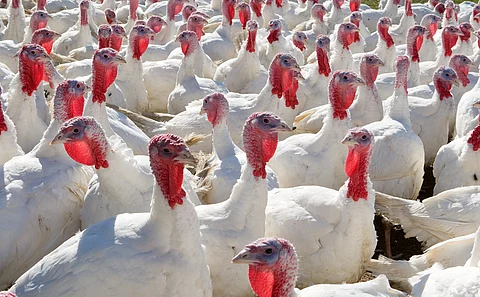

The Highly Pathogenic Avian Influenza (HPAI) H5N1 bird flu strain has “spilled over into wildlife” to infect over 500 species and at least 70 mammalian species, the United Nations has said.
The virus has established its presence in 108 countries, across five continents. It not spared even the endangered California condor and polar bears, the UN said in an update on the mutating virus.
Bird flu was found to have infected gentoo and King penguins in Antarctica in January this year.
Avian influenza has resulted in more than 300 billion bird deaths across the world, as the virus is seen to spreading increasingly, breaking species barriers, UN health officials said.
Madhur Dhingra from the Food and Agriculture Organization (FAO) said the virus poses a grave threat to the food and nutritional security of regions heavily dependent on poultry for their protein requirements.
Dhingra added that hundreds of millions of people’s livelihoods have been impacted by the virus, resulting in an economic burden on farmers that could discourage them from investing in appropriate biosafety measures.
Amid concerns about the spread of bird flu across the world, especially with at least 860 dairy herds and 61 humans infected in the US, the World Health Organization (WHO) in November urged stepping up surveillance on the pestilence.
Seventy six people have been infected with the H5 avian influenza strain in 2024, and most were farm workers, the UN statement said.
Thus far, no cases of the virus have been reported from Australia, Canada, China, Cambodia and Viet Nam.
Maria Van Kerkhove, director of Epidemic and Pandemic Threat Management for the WHO, said based on the latest science, “We assess the risk of infection for the public — you and I — is currently low.”
However, Kerkhove cautioned that persons working on farms and exposed to infected animals have higher risk, ranging from low to moderate.
“There is no evidence so far that the H5N1 viruses have adapted to spread between people and there has been no reported cases of human-to-human transmission,” she said.
The UN pandemic expert warned that the situation can change quickly. “As the virus is evolving, we must be prepared for such a scenario,” she stated.
Kerkhove said every case in humans must be investigated thoroughly and urged consumption of pasteurised milk or heating raw milk.
The suggestion comes in the backdrop of presence of the H5N1 virus found in raw milk in the US recently.
“We want to reiterate the critical importance of using a One Health approach across sectors — globally, nationally, and sub-nationally — to tackle avian influenza effectively, to minimise the risk in animals and humans,” she concluded in the statement.